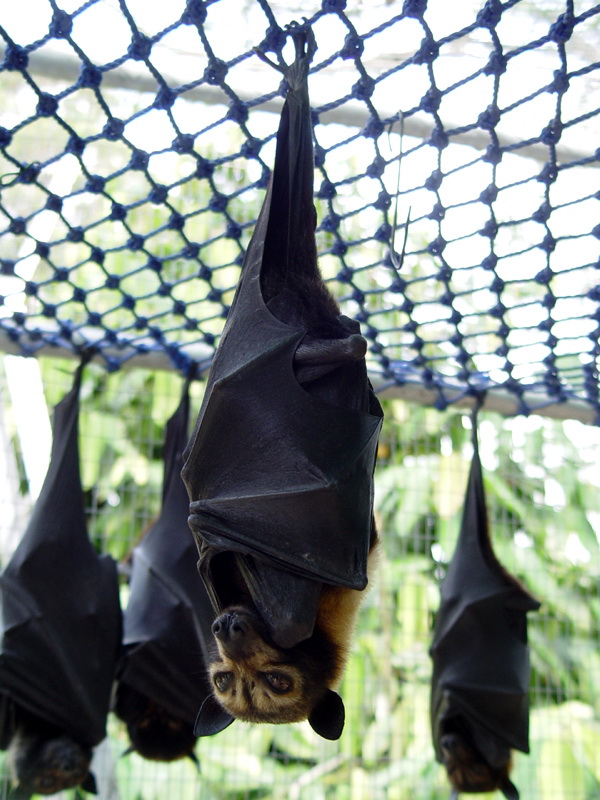|
| Query: island flying fox | Result: 11th of 26 | |
Spectacled Flying-fox (Pteropus conspicillatus) - Wiki
| Subject: | Spectacled Flying-fox (Pteropus conspicillatus) - Wiki
| |

| Resolution: 600x800
File Size: 195224 Bytes
Date: 2005:11:17 15:30:07
Camera: CYBERSHOT (SONY)
F number: f/2.0
Exposure: 10/1000 sec
Focal Length: 127/10
Upload Date: 2007:09:02 15:58:45
|
Spectacled Flying-fox
From Wikipedia, the free encyclopedia
[Photo] Brillenflughund, Spectacled flying-fox (Pteropus conspicillatus). Source: Photo taken at the Tolga Bat Hospital, Australia.
more photos of P. conspicillatus. Date 17.11.2005. Author Mnolf http://commons.wikimedia.org/wiki/User:Mnolf
The Spectacled Flying-fox, Pteropus conspicillatus also known as the Spectacled Fruit Bat, lives in Australia's north-eastern west regions of Queensland. It is also found in New Guinea and on the offshore islands including Woodlark Island, Alcester Island, Kiriwina, and Halmahera.
The Spectacled Flying-fox was listed as a threatened species under the Commonwealth Environment Protection and Biodiversity Conservation Act of 1999. They are considered vulnerable due to a significant decline in numbers as a result of loss of their prime feeding habitat and secluded camp sites.
Physical Characteristics
The head and body length is 22???25 cm, forearm 16???18 cm, weight 400???1000 g. A large black flying fox has pale yellow or straw-colored fur around its eyes. The mantle is pale yellow and goes across the back, neck, and shoulders. Some have pale yellow fur on the face and top of the head.
Habitat
Spectacled Flying-foxes are forest dwellers and rainforests are its preferred habitat. They prefer to roost in the middle and upper canopies of rainforest in the full sun. Colonies of the Spectacled Flying-fox can also be found in mangroves, paperbark and eucalypt forests. No colony is known to be found more than 7 km from a rainforest.
Diet
The Spectacled Flying-fox feeds at night on many different native species, for fruit, pollen and blossom; also a limited number of species for foliage. They will also feed on crops of mangoes, lichees and long-ons if farmers do not net their orchards. The foraging distance for these bats is up to 70km. As with many of the flying foxes, this species may drink seawater on the way to feeding sites.
http://en.wikipedia.org/wiki/Spectacled_Flying-fox
| The text in this page is based on the copyrighted Wikipedia article shown in above URL. It is used under the GNU Free Documentation License. You may redistribute it, verbatim or modified, providing that you comply with the terms of the GFDL. |
|
Comments |
|---|
| | Tim Senneff |
|
I am in a park ranger academy and would like to use this photo in a slide show. Can I do this?
Thanks,
Tim Senneff |
^o^
Animal Pictures Archive for smart phones
^o^
|
|
|

